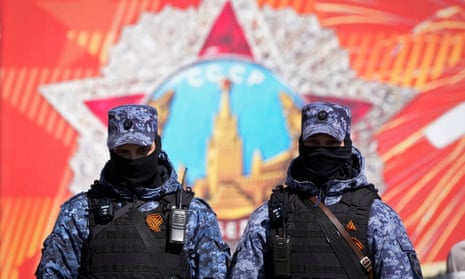At least six Russian regions have scrapped 9 May Victory Day parades that mark the Soviet victory over Nazi Germany amid fears over Ukrainian strikes, with a region 400 miles from the border being the latest to cancel.
The governor of Saratov announced the parade there would not go ahead because of “safety concerns”, adding to a string of cancellations that are a glaring admission of the country’s military vulnerability more than 14 months into the war.
Earlier, heads of Belgorod, Kursk, Voronezh, Oryol, and Pskov region, as well as the Russian-occupied Crimean peninsula, similarly cancelled their annual military parades.
“There won’t be a parade in order to not provoke the enemy with large numbers of equipment and service members in central Belgorod,” the regions’ head Vyacheslav Gladkov said last month.
Victory Day, when Russians celebrate the 1945 endpoint of what they call the “great patriotic war”, has gradually become the centrepiece of Vladimir Putin’s vision of Russian identity over his two decades in charge. The carefully orchestrated victory parades that take place across the country traditionally present the Kremlin with an opportunity to flaunt modern Russian military might.
Moscow’s invasion of Ukraine has further shifted the meaning of the celebration as Putin has sought to draw baseless historical parallels between the two wars, falsely framing Ukraine as a successor to Nazi Germany.
Last year during a speech, Putin said that the present-day Russian army was fighting in Ukraine “so that there is no place in the world for butchers, murderers and Nazis.”
“Victory will be ours, like in 1945,” Putin said at the time.
The cancellations came as Kyiv was making its final preparations for its much-anticipated counteroffensive.
Russia has sustained a number of embarrassing incidents and attacks at its military bases over the course of the fighting, including in occupied Crimea. A Ukrainian drone strike last week set ablaze a Russian fuel storage facility in the Crimean port of Sevastopol.
A senior lawmaker last week said the Russian military was not able “to guard the perimeter of our entire country,” urging civilian volunteers to get involved in defending Russia’s state borders.
after newsletter promotion
Speaking to journalists on Tuesday, Putin’s spokesperson Dmitry Peskov stressed that the security services were “doing everything necessary to ensure security” on Victory Day.
“Of course, we are aware that the Kyiv regime, which is behind a number of such attacks, terrorist acts, plans to continue its line,” Peskov said when asked by reporters if there was a threat of Ukrainian attacks on the 9 May.
There are signs that the authorities are also worried over drone attacks on its two biggest cities, Moscow and St Petersburg.
Ukraine has previously used drones to strike deep inside Russian territory, in one instance hitting an airbase near Ryazan, a city just 150 miles from Moscow.
Security services in the capital of Moscow announced last week that they were closing Red Square to the public for an unprecedented two weeks in preparation for the military parade where Putin is expected to make an appearance.
Baza, a Russian media outlet with sources in the security services, reported that the Russian ministry of defence was considering cancelling the aerial segment of the parade in both Moscow and St Petersburg, citing security concerns and a lack of trained pilots.
